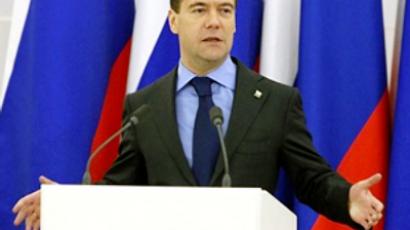Down with four wheels
Today is the day when you are supposed to leave the car at home. International Car-Free Day originated in Switzerland in the ’70s, but is being held in Moscow for only the second time.
Nevertheless its success is questionable, as the streets of the Russian capital are gridlocked as usual.
Still, if you ask the organizers of the Day Without a Car if their event is a failure, they would say it is not – they are not so naïve as to expect all the drivers not to start their engines in the morning. It is not realistic and it is not the point. The point is to make more people talk about what improvements can be made to the public transport system. And also put pressure on the lawmakers so that they stick to their promises to build new roads and transport infrastructure.
Supporters of the event believe there should be not only more access to the public transport, but new technology must be introduced as well so that public transport can be more comfortable and timely to be more appealing to people.
Moscow traffic jams are epic. People spend up to 2.5 hours daily in their cars, especially in the wintertime when the weather is bad, so they stock up on books, magazines and carry notebooks with them so as not to be idle when they get stuck.
The city of Moscow has one of the worst traffic problems in the world and loses up to US$1.3 billion annually because people spend time in their cars instead of working.
The lawmakers say it will take time to build new roads and infrastructure.
Still, for some people this is not just a one day event, but something they dedicate their life to.
When cyclists from the 32 Spokes Bicycle Club are not pedaling the pavement, they are hopping on to public transit to get to and from work.
Keeping their cars parked reduces their carbon footprints and keeps their environmental conscience clear and road rage to a minimum.
“The environment is highly negative, because everyone’s in a hurry, you get barged, and things like that. As you bike, you, on the contrary, relax and drop tensions, and you reach your office much faster,” 32 Spokes Bicycle Club member Konstantin Markachev says.
The World Wildlife Fund wants more motorists to opt for the green route as part of Car-Free Day. The international salute to the environment draws participants from more than 1,500 cities in 40 countries every September.
Moscow is taking part for the second time and some public transport is half price. Better use of natural resources and cleaner air are at the heart of the movement.
Pollution is just one problem. Gridlock is another, with almost three million drivers registered in Moscow alone, traffic gets so backed up that sometimes it feels faster to walk than it does to drive.
Supporters of the International Car Free Day in Moscow hope that the symbolism of this event will get more people out of their cars and on to modes of public transportation.
For years Aleksandr Morozov has been putting pressure on the city government to improve the tram system. But with millions piling on to cramped transportation daily, he says a comprehensive plan is needed to make travel comfortable, timely, and more attractive to potential commuters.
“I believe it should be a complex policy of the use of subway, tramway, bus, and trolleybus and even our supplementary railroads that are not included in transfer in the city,” Aleksandr Morozov of City and Transport movement, insists.
Morozov is asking city leaders to transfer funds from the roads budget to invest in more tram lines and in better technology so that more people like Konstantin will be passengers instead of drivers.













